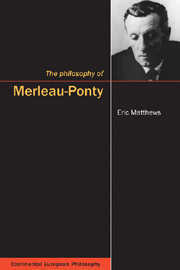7 - The Arts
Summary
Phenomenological philosophy, in Merleau-Ponty's conception, consists as we have seen in “re-learning to look at the world”, attempting to get behind the theoretical constructions that we erect on the basis of our immediate experience of the world in order to describe that experience itself. In so doing, he says, we do not simply reflect a pre-existing truth: philosophy is, “like art, the act of bringing truth into being”. The analogy between phenomenology and art, especially the visual arts, runs through Merleau-Ponty's writings, sometimes as asides to a general philosophical discussion, and sometimes in the form of extended essays on particular arts. His comments on the arts illuminate and are illuminated by his account of phenomenology as philosophy. As we shall see later, in the direction that his thought took in the last years of his life, as reflected in the two uncompleted books that were published only posthumously (The Prose of the World and The Visible and the Invisible) and in the last paper published before his death (“Eye and Mind”), the visual arts in particular and their relation to philosophy seem to become more central in his thinking. This development will be considered in the last section of this chapter and in Chapter 8. First, however, we should consider the relation of art and philosophy in his earlier works.
- Type
- Chapter
- Information
- The Philosophy of Merleau-Ponty , pp. 133 - 150Publisher: Acumen PublishingPrint publication year: 2002

